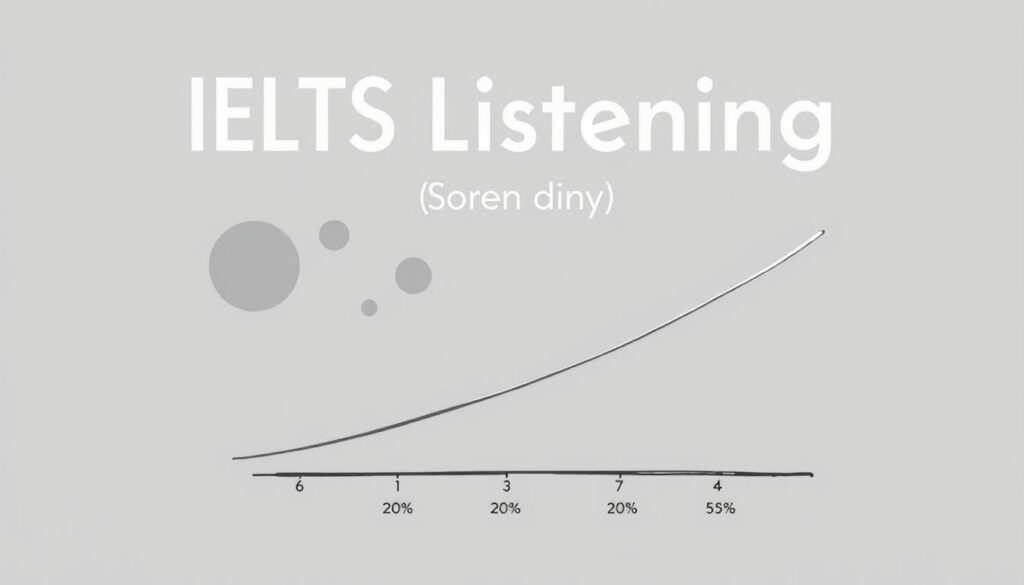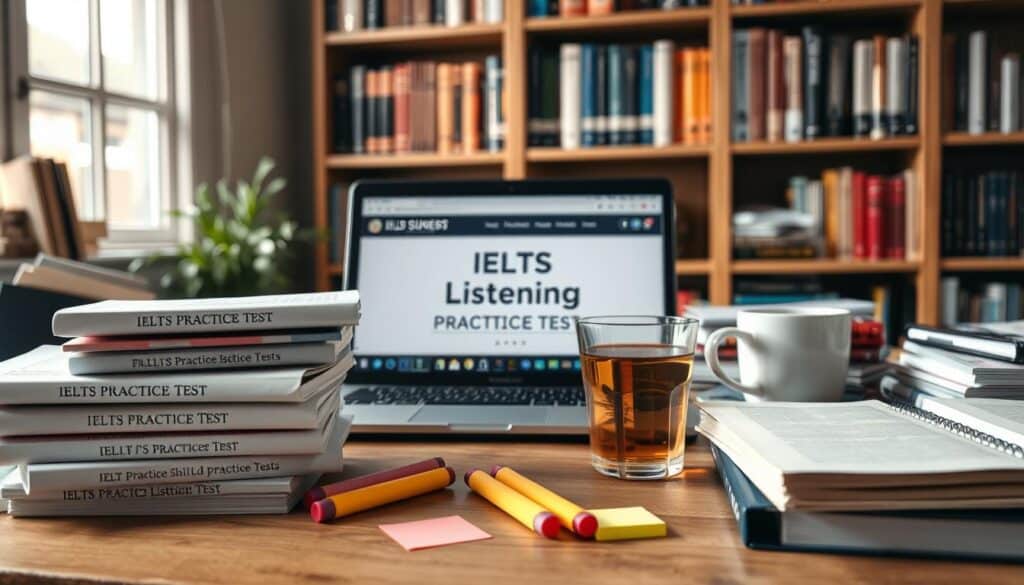Mastering the IELTS Listening test is a key part of achieving a high overall band score. The test is divided into four sections, each with different question types, and consists of 40 questions. Your score is based on the number of correct answers, with no negative marking. The band score ranges from 0 to 9, with half-point increments, making precision crucial for a high score.
The listening test is the same for both Academic and General Training candidates. Each section becomes progressively harder, starting with everyday conversations and moving to complex academic discussions. Understanding the scoring system is vital for targeted improvement. Small errors, like spelling mistakes, can significantly impact your score, so attention to detail is essential.
In this article, we will explore practical strategies and tips to enhance your listening skills. From understanding question types to effective practice methods, we will cover it all to help you achieve your desired band score.
Key Takeaways
- The IELTS Listening test consists of 40 questions across four sections.
- The score ranges from 0 to 9, with half-point increments.
- Both Academic and General Training tests have the same listening section.
- Small errors can lead to significant score differences.
- Understanding the scoring system is crucial for improvement.
Understanding the IELTS Test Format and Scoring
Understanding the structure and scoring system of the IELTS test is essential for achieving a high band score. The listening section consists of four recordings with 40 questions, each worth one mark. Your final score is based on the number of correct answers, with no penalties for incorrect ones.
Overview of the Listening Test Structure
The listening test is divided into four sections, each featuring different types of recordings and question formats. The recordings include conversations, monologues, and discussions, each becoming progressively more challenging. Understanding this structure helps candidates prepare effectively and manage their time during the test.
Band Score Conversion Explained
The IELTS band score ranges from 0 to 9, with half-point increments possible. Raw scores out of 40 are converted to band scores using a predefined scale. For example:
| Band Score | Raw Score Range |
|---|---|
| 5 | 16-20 |
| 6 | 23-27 |
| 7 | 30-34 |
| 8 | 35-39 |
The table above shows how raw scores translate into band scores. It’s important to note that scores are rounded to the nearest half band. For instance, a raw score of 6.1 becomes 6, while 6.85 rounds up to 7.
Grasping the scoring system helps set realistic goals and identify areas for improvement. By understanding how each question contributes to your final score, you can focus your study efforts more effectively.
Key Components of the IELTS Listening Section
The IELTS Listening test is designed to assess a wide range of listening skills. It features various types of recordings and questions to evaluate how well you can understand and interpret different spoken materials.
Types of Recordings and Questions
The test includes conversations and monologues. These recordings cover social and academic topics, from everyday conversations to complex lectures. The questions are diverse, including multiple-choice, matching exercises, and diagram labeling. Each question type requires different skills, such as identifying key details or understanding the main idea.
Scoring Criteria and Assessment Methods
Each correct answer earns one mark, with no penalties for incorrect ones. The final score is based on the total number of correct answers. It’s crucial to transfer answers accurately to the answer sheet, as errors can affect your band score. Authentic materials and realistic recordings contribute to the test’s difficulty, ensuring it accurately reflects real-life listening challenges.
Effective Techniques for “how to score ielts listening”
Scoring well in the IELTS Listening test requires a strategic approach. It’s not just about understanding English but also about mastering the test format and employing effective techniques.
Step-by-Step Strategies for Success
A well-structured plan is essential. Start by previewing the questions before the audio begins. This helps you identify key points to listen for, making your listening more focused and efficient.
Active listening is crucial. Pay attention to specific details like names, dates, and numbers. Take concise notes using symbols or abbreviations to keep up with the speaker’s pace.
After each section, review your answers. This helps catch any mistakes before moving on. Managing the one-time play policy means you can’t rewind, so staying focused is key.
Finally, cross-checking your answers ensures accuracy. By following these strategies, you can improve your listening skills and achieve a higher band score.
- Preview questions to know what to listen for.
- Practice active listening and note-taking.
- Review answers after each section.
- Stay focused to manage the one-time play policy.
With consistent practice and these techniques, you’ll be well-prepared to excel in the IELTS Listening test.
Practical Tips to Improve Your Listening Skills
Improving your listening skills is a cornerstone of achieving a higher band score in the IELTS test. By incorporating effective strategies into your daily routine, you can enhance your ability to understand and interpret spoken English.
Practicing with Authentic Audio Materials
One of the most effective ways to improve your listening skills is by using authentic audio materials. Podcasts, news broadcasts, and academic lectures are excellent resources. These materials expose you to real-life conversations, diverse accents, and varying speaking speeds, all of which are essential for the IELTS test.
Why Authentic Materials? They help you get used to how English is spoken in everyday situations. For example, podcasts cover a wide range of topics, from casual conversations to in-depth discussions, making them ideal for practice.
- Listen to English podcasts or news broadcasts for at least 15 minutes daily.
- Use TED Talks to practice listening to monologues on various topics.
- Incorporate academic lectures to get used to formal speaking styles.
Enhancing Vocabulary and Comprehension
Building your vocabulary and improving comprehension are key to better listening skills. The more words you know, the easier it is to understand spoken English.
Tips for Better Comprehension: Focus on understanding the main ideas and key details. Practice with different types of recordings to get used to various speaking styles and accents.
- Keep a notebook to write down new words you hear and look them up later.
- Practice summarizing what you hear to improve your understanding of the main idea.
- Listen to materials with different accents to get used to variations in pronunciation.
By combining regular practice with authentic materials and focusing on vocabulary and comprehension, you can significantly improve your listening skills and achieve a higher band score in the IELTS test.
Common Challenges and How to Overcome Them
While preparing for the IELTS Listening test, candidates often face specific challenges that can hinder their performance. Two of the most common issues are dealing with unfamiliar accents and managing test anxiety. Addressing these challenges effectively can significantly improve your band score.
Dealing with Accents and Fast Speech
One of the biggest hurdles in the IELTS Listening test is understanding different accents and fast speech. Since the test features speakers from various English-speaking countries, it’s crucial to get used to diverse accents. Here’s how you can tackle this challenge:
- Practice with diverse materials: Regularly listen to podcasts, news broadcasts, and TED Talks featuring speakers from different regions.
- Focus on key words: Pay attention to high-frequency vocabulary that often appears in the test.
- Improve your pronunciation: Familiarize yourself with how words are pronounced in different accents.
Managing Test Anxiety and Time Constraints
Test anxiety and time management are critical factors that can impact your performance. Staying calm and organized during the test is essential for achieving a high band score. Here are some strategies to help you manage these issues:
- Simulate test conditions: Practice under timed conditions to build your endurance and focus.
- Stay calm and focused: Use relaxation techniques like deep breathing to manage anxiety during the test.
- Review your answers: Allocate time to check your answers before moving to the next section.
| Challenge | Strategy |
|---|---|
| Unfamiliar Accents | Listen to diverse English materials regularly |
| Fast Speech | Practice with fast-paced audio recordings |
| Test Anxiety | Use relaxation techniques and mock tests |
| Time Management | Simulate test conditions during practice |
By addressing these common challenges head-on, you can improve your listening skills and achieve a higher band score in the IELTS Listening test. Remember, consistent practice and a strategic approach are key to overcoming these obstacles and excelling in the test.
Strategies to Answer Different Question Types
Each question type in the IELTS Listening test presents unique challenges. Understanding these challenges and employing tailored strategies can significantly enhance your performance.
Multiple Choice and Matching Exercises
For multiple-choice questions, quickly preview the options to identify keywords. Listen for specific details that match the options. In matching tasks, focus on relationships between elements. Practice these under timed conditions to build speed and accuracy.
Summary, Diagram, and Labeling Techniques
When dealing with summaries or diagrams, concentrate on key information and spatial context. For labeling, note missing information and listen for cues that help place labels correctly.
Effective Note-Taking Methods
Use symbols and abbreviations to take notes efficiently. Organize your notes clearly to avoid confusion. Review your answers after each section to catch errors early.
| Question Type | Strategy |
|---|---|
| Multiple Choice | Preview options, identify keywords |
| Matching | Focus on relationships |
| Summary/Diagram | Concentrate on key info and context |
| Note-Taking | Use symbols, stay organized |
Building Your Overall English Proficiency
Enhancing your overall English skills plays a vital role in improving your IELTS Listening performance. While focused practice is essential, integrating listening with reading, writing, and speaking creates a well-rounded approach that boosts your band score.
Integrating Listening with Reading, Writing, and Speaking
Listening and reading skills are closely linked, as both require understanding context and identifying key details. Strong reading habits can improve your vocabulary, which directly benefits your listening comprehension. Similarly, speaking regularly in English enhances your ability to recognize and produce sounds, rhythms, and stress patterns, making it easier to understand spoken English.
Writing also contributes to better listening skills by reinforcing grammar and sentence structure. When you practice writing, you become more aware of how ideas are organized, which helps you follow complex discussions in the listening section. This holistic approach ensures that all your language skills support each other, leading to a higher overall band score.
| Skill | Contribution to Listening |
|---|---|
| Reading | Expands vocabulary and enhances understanding of complex texts. |
| Writing | Improves grammar and structure awareness, aiding comprehension of spoken English. |
| Speaking | Enhances pronunciation and rhythm recognition, making it easier to understand different accents. |
By engaging in integrated practice sessions that combine listening, reading, writing, and speaking, you can achieve a balanced skill set. This approach not only strengthens your listening abilities but also prepares you for the diverse challenges of the IELTS test.
Diversifying your practice methods builds confidence and capability across all areas. For instance, listening to podcasts while taking notes can improve both your listening and writing skills. Speaking with native speakers exposes you to real-life conversations, enhancing your ability to understand diverse accents and speeds.
Visit this resource for more tips on improving your English proficiency and achieving a higher band score in the IELTS Listening test.
Utilizing Practice Tests and Additional Resources
Consistent practice is key to excelling in the IELTS Listening test. By using authentic materials and maintaining a structured study plan, you can significantly enhance your performance and achieve your desired band score.
Exploring Official IELTS Materials and Online Tools
Official IELTS practice materials are essential for familiarizing yourself with the test format. Resources like the Official IELTS Practice Materials and online platforms such as IELTS Assist provide realistic practice tests. These materials help you understand the question types and improve your time management skills.
Setting Up a Consistent Practice Schedule
A well-structured study plan is crucial for steady improvement. Dedicate time each day to practice listening tests and review your answers. This routine helps identify weaknesses and track progress over time. Start with timed practice sessions and gradually increase the difficulty as you become more confident.
- Schedule regular practice sessions to maintain consistency.
- Use a timer to simulate real test conditions.
- Review your answers to understand mistakes and improve.
By combining authentic practice materials with a disciplined schedule, you can effectively prepare for the IELTS Listening test and achieve a higher band score.
Conclusion
Mastering the IELTS Listening test is a key part of achieving a high overall band score. By combining practical strategies with consistent practice, you can significantly improve your performance. Understanding the test format and scoring system is essential for targeted improvement. Regular practice with authentic materials, such as podcasts and news broadcasts, helps you get used to diverse accents and speaking styles.
Building your overall English proficiency is crucial for achieving a high band score. This includes improving your vocabulary, comprehension, and note-taking skills. Additionally, staying calm and managing your time effectively during the test can make a big difference. By following these tips and maintaining a consistent study routine, you can overcome challenges and reach your goals.
Remember, consistent effort and a well-rounded approach are key to success. With dedication and the right strategies, achieving a higher band score is definitely within your reach.
FAQ
What is the average band score for the IELTS listening test?
The average band score for IELTS listening typically ranges between 5.5 to 6.5. However, scores can vary based on individual performance and preparation.
How many correct answers do I need for a high band score?
Each question in the listening test is worth one mark. To achieve a high band score, aim for at least 30 out of 40 correct answers.
Can I improve my listening skills quickly for the test?
Yes, consistent practice with authentic materials and focusing on vocabulary building can significantly enhance your listening skills in a short time.
What are the most common types of questions in the listening test?
The most common question types include multiple choice, labeling diagrams, and completing summaries. Practicing these will help you prepare effectively.
How does the scoring system work for the listening section?
The scoring system is based on the number of correct answers. Each correct answer adds to your raw score, which is then converted into a band score.
What if I struggle with understanding different accents?
Exposure to various accents through practice tests and real-life conversations can help improve your comprehension and reduce difficulties.
How much time should I spend on each question during the test?
Allocate about 30-45 seconds per question. Manage your time wisely to avoid running out of it before completing all sections.
Are there any tips to avoid losing marks in the listening test?
Avoid guessing too much and ensure you read the questions carefully before listening. Always review your answers if time permits.
Can I use my own words for answering questions?
Yes, but make sure your answers are clear and match the required format. Avoid using abbreviations unless specified.
How important is vocabulary in achieving a high score?
Vocabulary plays a crucial role in understanding the context and answering questions accurately. Focus on expanding your word list regularly.
What resources are best for practicing the listening test?
Use official practice materials, online tools, and authentic audio recordings to simulate real test conditions and improve your skills.
How can I stay calm and focused during the test?
Practice mindfulness, take deep breaths, and stay hydrated. Familiarize yourself with the test format to reduce anxiety.
What is the difference between a band score and a level?
A band score is a numerical rating (e.g., 6.5), while a level indicates your proficiency level (e.g., advanced). Both are used to assess your performance.
Can I retake the test if I’m not satisfied with my score?
Yes, you can retake the test as many times as needed. However, it’s recommended to wait until you’ve had additional preparation and practice.
How long does it take to see improvement in my listening skills?
Consistent practice of 15-30 minutes daily can show noticeable improvement within 4-6 weeks. Stay committed and track your progress.
What is the best way to review my mistakes after a practice test?
Analyze each incorrect answer to understand where you went wrong. Focus on improving those specific areas in your next practice session.










